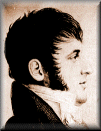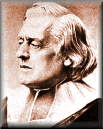 |
 |
 |
 |
 |
To Eugene de Mazenod, born in Provence, southern France, August 1, 1782, the world offered much. Through his father he was of the nobility: through his mother he was comfortably wealthy. But within eight years of his birth his world was to be turned on its head. The fury of the French Revolution made Eugene a political refugee for twelve
years. His family fled, his parents separated, On his return to his homeland at the age of twenty he sought to find his place in the new France. It was a time of growing disillusionment, but also of a challenging awakening to deeper realities. His gaze was drawn more and more away from himself to the pressing needs of the spiritually and materially needy of the countryside. He grew in certainty that his place was to be with them. Despite opposition he decided to become a priest, and was ordained on December the 21st, 1811. To the young Father de Mazenod, religion in France presented a sorry sight - enshrined atheism, entrenched anti-clericalism, parishes without priests, churches without people. He drew together a small band of like-minded priests inspired by his enthusiasm to rebuild God's Kingdom, who later came to be known as the Missionary Oblates of Mary Immaculate. Beginning in Provence, they spread throughout Europe and then to all continents. They
spared no effort, brooked no delay, sought no ease in their work for God. Eugene was a
'second Paul' a man 'impassioned with Christ'. Appointed Bishop of Marseilles, he cared
both for his diocese and his religious family, radiating faith and energy over the long
years of his life. On his death, May 21st, 1861, Eugene de Mazenod bequeathed his men a unique vision of daring for the Kingdom of God, and a sense of urgency for the salvation of souls. The Church recognised these perduring graces and declared him blessed on October the 19th 1975. His cannonization followed in 1995. The priest from Provence, through his Oblates, has become a sign for the whole Church - a sign of grace accepted, of grace wondrously fulfilled, of grace bursting forth unto glory.
|
 |
||
 |
||
 |
||
 |
||
 |
||
 |
||
 |
||
 |
||
 |
||
 |
||
 |
||
 |
||

 his inheritance
disappeared. Long years of exile in poverty and uncertainty in Venice and Naples
alternated with brief spells of hope and enjoyment of court life in Palermo.
his inheritance
disappeared. Long years of exile in poverty and uncertainty in Venice and Naples
alternated with brief spells of hope and enjoyment of court life in Palermo.

